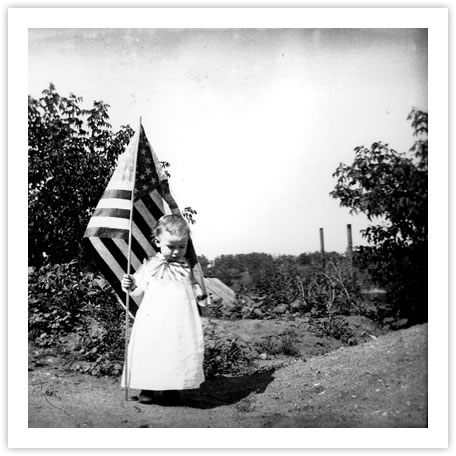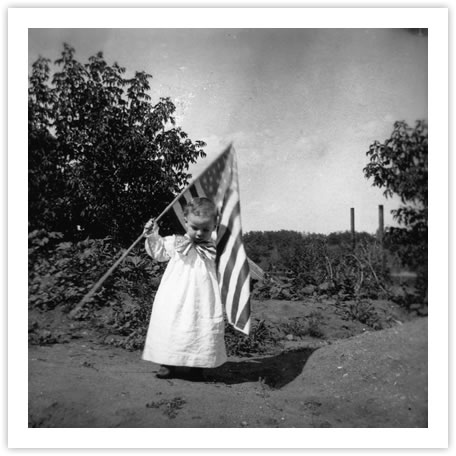 July 4/.98 This is indeed a “glorious Fourth” for to us comes the news that Admiral Sampson has destroyed Cervera’s fleet, and General Shafter is threatening to bombard Santiago, unless they surrender at once. We pray that this blow to her armies may cause Spain to sue for peace, and thus end this cruel war.— Robert wanted to shoot fireworks so his father got them for him. After his nap he called for them again saying, “more shoot fire-tackers, lots fun.” When asked who’s boy he is, he answered “uncle Sam’s boy,” so I took his picture with the U.S. flag floating over him.— He can tell the stories of “Old mother Hubbard”, “Cock Robin”, in baby language. Anyone could tell what he was attempting: for example “ole Hubbard, went tubard dit dog bone, tubard bare, so dog had none. Went ba-kers dit bead, dog dead” etc.—
July 4/.98 This is indeed a “glorious Fourth” for to us comes the news that Admiral Sampson has destroyed Cervera’s fleet, and General Shafter is threatening to bombard Santiago, unless they surrender at once. We pray that this blow to her armies may cause Spain to sue for peace, and thus end this cruel war.— Robert wanted to shoot fireworks so his father got them for him. After his nap he called for them again saying, “more shoot fire-tackers, lots fun.” When asked who’s boy he is, he answered “uncle Sam’s boy,” so I took his picture with the U.S. flag floating over him.— He can tell the stories of “Old mother Hubbard”, “Cock Robin”, in baby language. Anyone could tell what he was attempting: for example “ole Hubbard, went tubard dit dog bone, tubard bare, so dog had none. Went ba-kers dit bead, dog dead” etc.—
The second story porch facing the river is finished, and from it we have a magnificent view of the river. From this elevation there are variations of beauty as the light changes with the march of the day god. When the day is done and the departed sun leaves an afterglow that bronzes the greens of earth, and turns into molten copper the waters of the Mississippi, even the most prosy of us are given to poetic dreams, and the witchery of the scene holds us captive.
— Lida Brooks (Toomer) Calhoun, Journals, (1898)
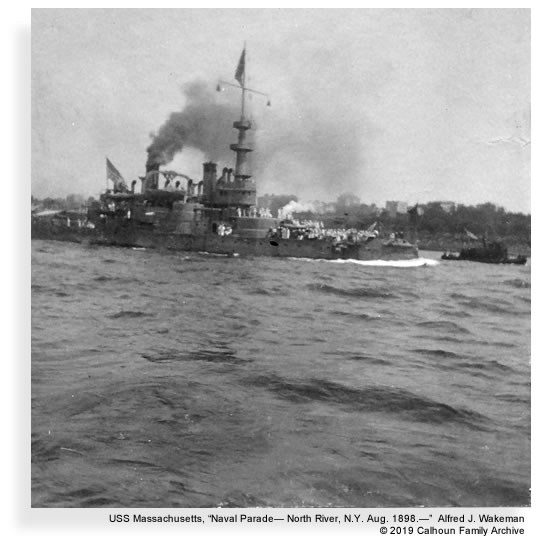 On February 15, 1898, the USS Maine, a battleship, exploded in the harbor at Havana, Cuba and sparked the Spanish-American War. There was already tension between Spain and the US; but, it seemed as if President McKinley would continue on a diplomatic course; until, his hand was forced by the sinking of the Maine; remember the Maine? A naval inquiry determined that there had been a submerged mine. The media called it “Spanish Treachery!” Later scholars have concluded that it was an accident, a coal bunker exploded.
On February 15, 1898, the USS Maine, a battleship, exploded in the harbor at Havana, Cuba and sparked the Spanish-American War. There was already tension between Spain and the US; but, it seemed as if President McKinley would continue on a diplomatic course; until, his hand was forced by the sinking of the Maine; remember the Maine? A naval inquiry determined that there had been a submerged mine. The media called it “Spanish Treachery!” Later scholars have concluded that it was an accident, a coal bunker exploded.
Send in the Marines. The American fleet was commanded by Rear Admiral William T Sampson of the North Atlantic Squadron and Commodore Winfield Scott Schley of the Flying Squadron. Admiral Pascual Cervera y Topete defended Cuba at the helm of the Spanish Caribbean Squadron. The Americans found the Spanish fleet bottled up in Santiago Bay and set up a blockade. Having a meeting ashore, Sampson and two ships left the line on the morning of July 3rd. Seeing a chance to escape, Cervera sailed for open sea with guns ablaze. The remaining US fleet were enough to sink every last one of the fleeing ships.
![]()
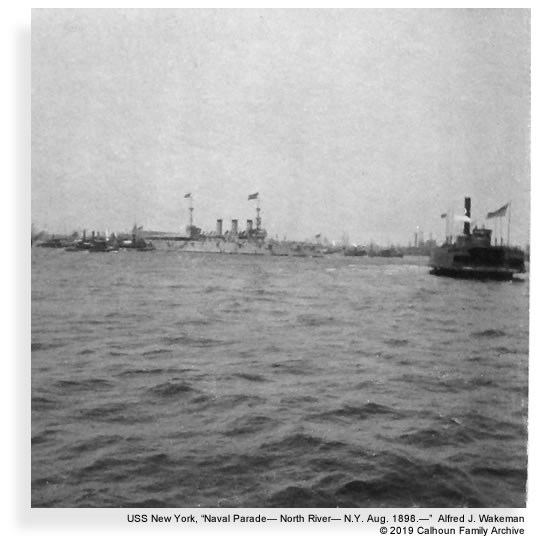 The next day Sampson proclaimed “The Fleet under my command offers the nation as a Fourth of July present, the whole of Cervera’s Fleet.” Commodore Schley didn’t take kindly to Rear Admiral Sampson taking credit for command. In fact, the USS New York didn’t join the fight until late, after returning from shore.
The next day Sampson proclaimed “The Fleet under my command offers the nation as a Fourth of July present, the whole of Cervera’s Fleet.” Commodore Schley didn’t take kindly to Rear Admiral Sampson taking credit for command. In fact, the USS New York didn’t join the fight until late, after returning from shore.
America won the war. The fleet returned in August with a great display of power to a naval parade in New York harbor. Robert’s future father-in-law, Alfred J. Wakeman, took pictures of the passing ships. In December, Spain agreed in the Treaty of Paris to cede territory to the US including Puerto Rico.
A “glorious Fourth”; victory filled adults with pride. A child waving a flag was charged with symbolic meaning for his mother more than the flag would be for him. But, those “fire-tackers”, they were “lots fun”. As an adult, Robert Lowry Calhoun, remembered the second-story porch overlooking the Mississippi. “When I was small, my father and I used to enjoy sitting out there during thunderstorms over the river. He could hear the thunder, and loved it.” They both were deaf as adults. I doubt the firecrackers had anything to do with it.
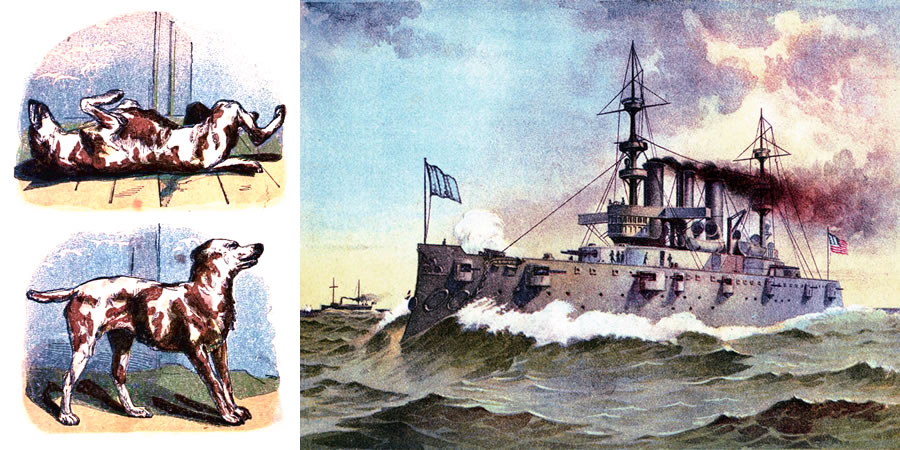 |
| Left: “The poor Dog was dead”, “The poor Dog was laughing.” Old Mother Hubbard and Her Dog Right: “The ‘New York’. Capture of the Blockade Runner.” Murat Halstead, Our Country in War, (1898) |
![]()
What do we think about as children? I imagine Robert was working out for himself what happened to the dog; mulling over in his mind, “tubard bare, so dog had none… dog dead” and then in the next stanza, laughing. How is a boy of two to know that after the dog dies, after our boys go off to war and die, they don’t come back.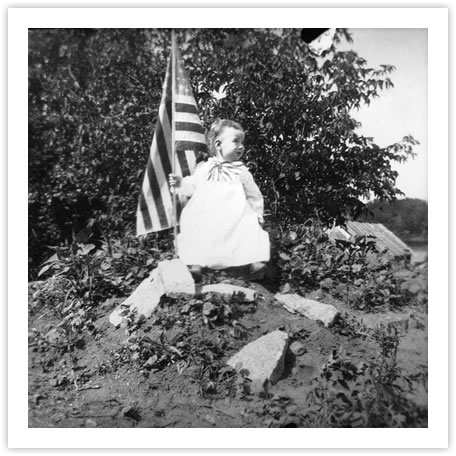 |
OLD MOTHER HUBBARD Old Mother Hubbard Went to the cupboard To get her poor Dog a bone; But when she came there The cupboard was bare, And so the poor Dog had none. She went to the baker's, To buy him some bread, But when she came back The poor Dog was dead. She went to the joiner's, To buy him a coffin, But when she came back The poor Dog was laughing. ... Sarah Catherine Martin, Old Mother Hubbard and Her Dog, New York: 186?. |
| As an adult I am mulling over what my patriotism amounts to. I don’t wave the flag; however, somewhere very deep within me I care to my core what will become of this country. “O beautiful for spacious skies, for amber waves of grain.” This is the country for which “the most prosy of us are given to poetic dreams.” “From California to the New York island,” wrote Woody Guthrie. And this is enough. He knew this country and loved it too. Yet, like me, he feared we could lose it to those not sharing our sense of place. |
As I went walking I saw a sign there
And on the sign it said "No Trespassing."
But on the other side it didn't say nothing,
That side was made for you and me.
This Land Is Your Land, Words and Music by Woody Guthrie (1956).
|
When I was a teenager, I was active in protests and marches. I had to work on a weekend recently when the Women’s March took place in New York City. The train on a normal weekend is never crowded. That day the cars were full of anticipation and placards. An energy filled the cars that recalled for me a sense of longing, a longing for something promised and never delivered. Long ago, on April 28, 1974, I was in Washington D.C. to share my voice with 10,000 others in a call for Richard Nixon’s impeachment. As The Cornell Daily Sun reported, “The march and following rally, held under cloudless skies and a hot sun, brought together a wide range of political groups and sentiments.” Phil Ochs played. He sang, “The speeches of the President are the ravings of a clown… Richard Nixon, find yourself another country to be part of.” Nixon resigned in August. It’s nice think we had something to do with it; but, I bet it was the tapes.
THE POWER AND THE GLORY Come and take a walk with me thru this green and growing land Walk thru the meadows and the mountains and the sand Walk thru the valleys and the rivers and the plains Walk thru the sun and walk thru the rain refrain: Here is a land full of power and glory Beauty that words cannot recall Oh her power shall rest on the strength of her freedom Her glory shall rest on us all, on us all From Colorado, Kansas, and the Carolinas too Virginia and Alaska, from the old to the new Texas and Ohio and the California shore Tell me, who could ask for more? refrain Yet she's only as rich as the poorest of her poor Only as free as the padlocked prison door Only as strong as our love for this land Only as tall as we stand refrain But this land is still troubled by men who have to hate; They twist away our freedom and twist away our fate. Law is their weapon, and treason is their cry, You can stop them if you try. refrain Phil Ochs, The Power and The Glory, 1963. |
After the rally a group moved away from the crowd and then ran… toward the Justice Department. I went with them. When they started breaking windows, I had second thoughts about being there. What had I become involved in? They turned out to be a splinter group of the Students for a Democratic Society (SDS), the Attica Brigade. I went home.
Phil Ochs wrote a song that captures my patriotism, The Power and The Glory. The last stanza, which was not in the released recording, resonants with me. We need to listen to his words. But it’s the first stanza, and the second, that are the country I love. The refrain, “Here is a land full of power and glory, beauty that words cannot recall” can also be heard in Lida’s words. “When the day is done and the departed sun leaves an afterglow that bronzes the greens of earth, and turns into molten copper the waters of the Mississippi, even the most prosy of us are given to poetic dreams, and the witchery of the scene holds us captive.”
|
